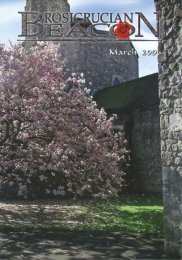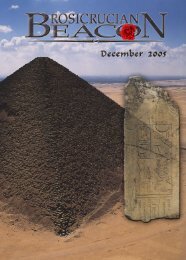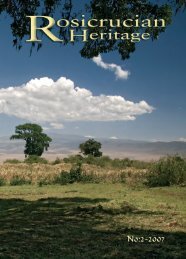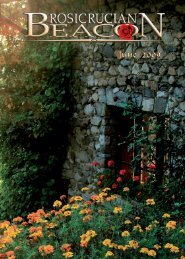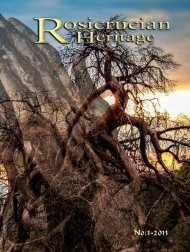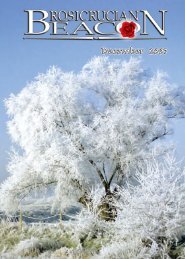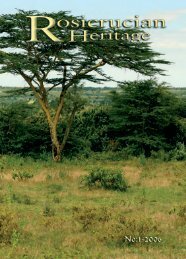Rosicrucian Beacon Online - 2012-12 - AMORC
Rosicrucian Beacon Online - 2012-12 - AMORC
Rosicrucian Beacon Online - 2012-12 - AMORC
You also want an ePaper? Increase the reach of your titles
YUMPU automatically turns print PDFs into web optimized ePapers that Google loves.
Turba Philosophorum (‘Assembly of Alchemical<br />
Philosophers’), Basel, Ludwig König, 1613. An<br />
anonymous text based on earlier Greek sources<br />
which was originally written in Arabic circa 900. It is<br />
comprised of a series of orations by famous figures<br />
in natural philosophy such as Pythagoras. Turba<br />
was among the earliest and most popular medieval<br />
alchemical texts in Europe. [Image and text from: http://www.<br />
lib.udel.edu/ud/spec/exhibits/alchemy/ia.html]<br />
and theoretical structures of Alexandrian alchemy,<br />
and was quoted as a final source by European<br />
alchemists for hundreds of years after the 13 th<br />
century revival. The prevalence of Arabic words in<br />
European alchemy, and even in modem chemistry,<br />
many of them coined by Geber, demonstrates the<br />
great impact of the Islamic school. Thus it appears<br />
that when the first translation of a text, namely,<br />
The Revelations of Morienus, first appeared in<br />
Europe (Paris, 1559) from this influential Islamic<br />
school of alchemy, the West began to reclaim its<br />
own Aristotelian heritage. However, although<br />
the influence of Islamic alchemy was great, the<br />
influence of the Byzantine school and even of<br />
indigenous European alchemical texts must also<br />
be re-evaluated.<br />
The Mythical Morienus<br />
Lee Stavenhagen’s translation of the Revelations<br />
of Morienus in the 1970s 8 raises serious questions<br />
about this text, both as to the date of its<br />
transmission, its influence and its importance.<br />
The English scholar, Robert of Chester, together<br />
with a certain Hermann the Dalmatian, 9 translated<br />
the Koran into Latin by 1143. It was long held that<br />
in the following year, 1144, Robert of Chester then<br />
turned his attention to the Revelations.<br />
Stavenhagen’s analysis of the five earliest<br />
texts of the Revelations prior to its first printed<br />
appearance in 1559, demonstrates that the<br />
1559 version was the result of many centuries<br />
of ‘patchwork-quilt’ editing, involving several<br />
differing manuscripts. 10 The myth of a single<br />
translation by Robert of Ketton (Chester) quickly<br />
disappears on several grounds, and the only<br />
reference to an Arabic original appears in some<br />
13 th century Islamic texts. The actual original does<br />
not survive.<br />
Even a cursor y reading of the tex t<br />
demonstrates that this is no encyclopaedic<br />
compilation of Alexandrian alchemy, but rather<br />
a purely Arabic text given an Alexandrian varnish<br />
through the introduction of the mythical Christian<br />
sage Morienus. Clearly, the Revelations were not<br />
the single, all-encompassing source of the 13 th<br />
century revival of European alchemy they were<br />
once thought to be. 11<br />
Of course, the Islamic world’s influence on<br />
European alchemy was great. But if Islam was<br />
the source of the European familiarity with the<br />
Alexandrian tradition, then why were the Italian<br />
humanists of the 15 th century so anxious to<br />
translate the Hermetic corpus for themselves<br />
when it became available in Greek rather than<br />
Arabic?<br />
Other Sources of the Revival<br />
The Revelations, despite their general inadequacy<br />
as either an important alchemical text or a<br />
source based on the Alexandrian school, were<br />
popular enough to have survived in many<br />
© Supreme Grand Lodge of <strong>AMORC</strong><br />
Volume 2 - No. 4 - December <strong>20<strong>12</strong></strong> 5


